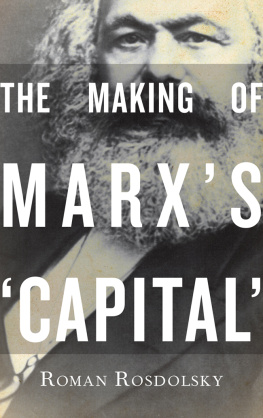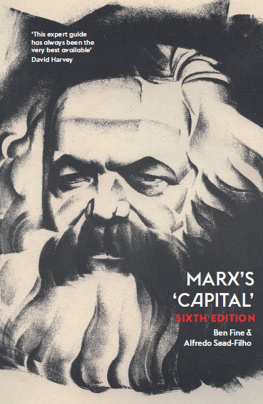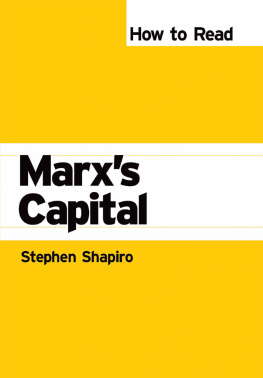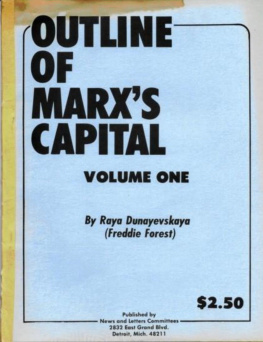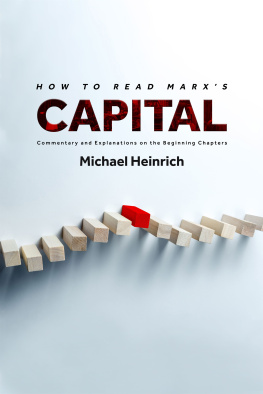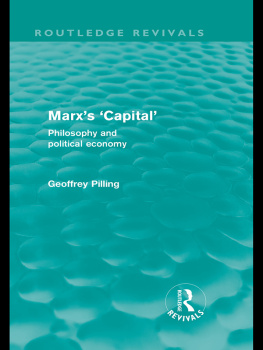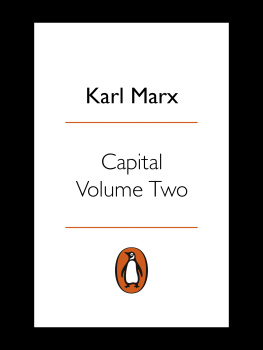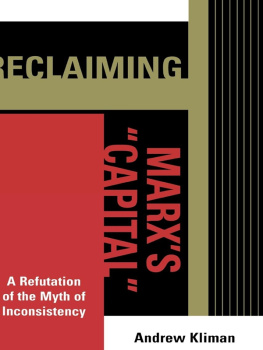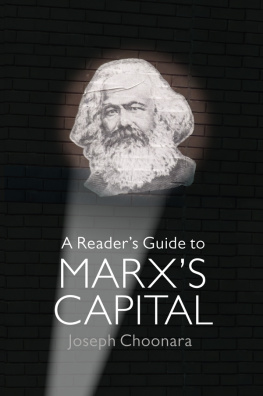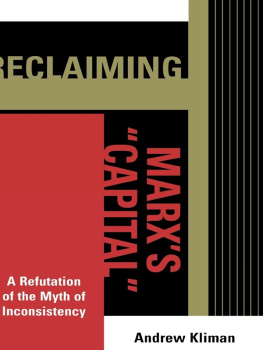First published in Germany by Europaische
Verlagsanstalt GmbH as Entstehungsgeschichte des
Marxschen Kapital
Copyright Europische Verlagsanstalt,
Frankfurt am Main 1968
This translation first published 1977 by Pluto Press
First paperback (abridged) edition published 1980
by Pluto Press
Second (unabridged) paperback edition published
1989 by Pluto Press in two volumes
Copyright Pluto Press 1977
ISBN 9780861049158 vol 1 paperback
ISBN 0861049152 vol 1 paperback
ISBN 9781783716395 Kindle eBook
ISBN 9781783716388 EPUB eBook
Printed and bound by Antony Rowe Ltd, Eastbourne
Authors Preface
In 1948, when I first had the good fortune to see one of the then very rare copies of Marxs Rough Draft, it was clear from the outset that this was a work which was of fundamental importance for marxist theory. However, its unusual form and to some extent obscure manner of expression made it far from suitable for reaching a wide circle of readers. I therefore decided, first, to provide a commentary on the work and, second, to make a scientific evalution of some of the new findings which it contained. The first exercise (mainly covered by Parts II-VI) necessitated an exposition of the Rough Drafts most important arguments, as far as possible in Marxs own words. The second required detailed discussions of particular aspects, which are to be found in the first, introductory, and seventh, concluding, parts of this work.
Completion of the work presented a number of difficulties. Inhabiting a city whose libraries contained only very few German, Russian or French socialist works (let alone such indispensable periodicals as Kautskys Neue Zeit) I was restricted to the few books in my own possession, and often doubted the practicability of the venture. But this was not the only problem. The more the work advanced, the clearer it became that I would only be able to touch upon the most important and theoretically interesting problem presented by the Rough Draft that of the relation of Marxs work to Hegel, in particular to the Logic and would not be able to deal with it in any greater depth.
Of all the problems in Marxs economic theory the most neglected has been that of his method, both in general and, specifically, in its relation to Hegel. Recent works contain for the most part platitudes which, to echo Marxs own words, betray the authors own crude obsession with the material and total indifference to Marxs method.
What would one make of a psychologist who was interested only in Freuds results, but rejected the question of the manner in which Freud obtained those results as being irrelevant or even metaphysical? One could only shrug ones shoulders. But this is precisely how most present-day critics of, and experts on, Marx judge his economic system. Either they totally refuse to discuss his dialectical method because they are opposed to metaphysics (such as the adherents of modern theory) this has the advantage of avoiding a real study of this method or the critique is restricted to a few platitudes, better left unsaid. This even applies to such a prominent critic as Joseph Schumpeter.
Schumpeter writes in one of his last works that, although the author of Capital was a neo-Hegelian, it would be a mistake and an injustice to Marxs scientific powers... to make this element the master key to the system. Of course, Marx retained his early love during the whole of his lifetime. He enjoyed certain formal analogies which may be found between his and Hegels argument. He liked to testify to his Hegelianism and to use Hegelian terminology. But this is all. Nowhere did he betray positive science to metaphysics.
What Schumpeter says here is, of course, nothing new. As early as 1922 Lukacs already complained about the bad habit of regarding the dialectic as a superficial stylistic ornament... Even otherwise conscientious scholars like Professor Vorlnder, for example, believed that they could prove that Marx had flirted with Hegelian concepts in only two places and then again in a third place. Yet they failed to notice that a whole series of categories of central importance and in constant use

